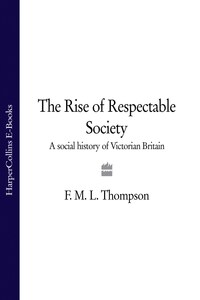THE RISE OF RESPECTABLE SOCIETY
A Social History of Victorian Britain
1830–1900
William Collins
An Imprint of HarperCollinsPublishers 1 London Bridge Street London SE1 9GF
A Fontana Press Original 1988
Copyright © F. M. L. Thompson 1988
The Author asserts the moral right to be identified as the author of this work
A catalogue record for this book is available from the British Library
All rights reserved under International and Pan-American Copyright Conventions. By payment of the required fees, you have been granted the nonexclusive, nontransferable right to access and read the text of this e-book on-screen. No part of this text may be reproduced, transmitted, downloaded, decompiled, reverse engineered, or stored in or introduced into any information storage and retrieval system, in any form or by any means, whether electronic or mechanical, now known or hereinafter invented, without the express written permission of HarperCollins e-books.
Source ISBN: 9780007291526
Ebook Edition © FEBRUARY 2016 ISBN 9780007392780 Version: 2016-01-04
HarperCollinsPublishers has made every reasonable effort to ensure that any picture content and written content in this ebook has been included or removed in accordance with the contractual and technological constraints in operation at the time of publication.
It has sometimes been remarked that all forms of history are becoming social history, and, less frequently, it has been claimed that social history is total history, alone capable of comprehending and articulating all facets of past human experience. This series, which aims to present in three volumes a view of the social history of Britain from the early eighteenth century to the mid-twentieth century, is not particularly attached to either proposition; it has no designs on the autonomy of other branches of history, though conscious of its close relations with economic history, and no pretensions to be all-embracing. It has the more modest and pragmatic aim of tackling the great outpouring of research and publication in British social history which has taken place in the last twenty years, and of attempting to integrate the fruits of these detailed and original studies into works which will be more accessible to students coming fresh to the subject and readers who have no time or inclination to scan a hundred books and articles in order to get the feel of a century. The aim, however, is also more ambitious than this may sound: the purpose is not to provide a survey and summary of what other scholars have said, but to construct an interpretation of continuity and change in society, in its structure, its institutions, its customs and habits, and its class and gender relationships. The three volumes cover the ‘long’ eighteenth century, extending to 1830; the Victorian period; and the twentieth century. The editorial brief leaves each author to make sense of the material on his century in his own way: there is uniformity of structure in the thematic organization of each volume, but no uniformity of views, no party line. This is not a way of avoiding brickbats or shirking editorial responsibilities, it is just the way history works as a humane and liberal profession. If the result is a series which provokes discussion and stimulates further research and re-interpretation, that will be more than sufficient justification for the enterprise.
January 1988
F.M.L. THOMPSON
It is fitting that an Editor who announces that the time is ripe to take stock of the effects of the explosion of interest in the social history of Britain should be the first to respond to his own call, if only to demonstrate that it is possible to offer a synthesis whatever the hazards of being tripped up on this or that point by the specialists. The expansion of social history, moreover, has not been a simple matter of the unearthing of new facts, new information, and new material by researchers digging in previously unknown or untapped sources, although there has been plenty of that. It has been above all a redefinition and enlargement of the territory of social history using instruments and concepts adapted from social anthropology and sociology, as well as quantitative methods, alongside the older guides derived from political economy whether of liberal or Marxist varieties. Where matters of faith, doctrine, or ideology are involved the synthesizer is necessarily stepping through a minefield. Nevertheless, the very fact that social history is about ideas and ways of viewing the behaviour and relationships of groups, genders, communities, generations, and classes, and not simply about the ‘facts’ of life – although sex is an important and often central activity which earlier generations of historians preferred to sweep under the carpet – means that no single overview can ever claim to be either comprehensive or definitive. Hence the present volume is offered as no more than one out of several possible ways of depicting and attempting to understand what made Victorian society tick, and how it developed.








